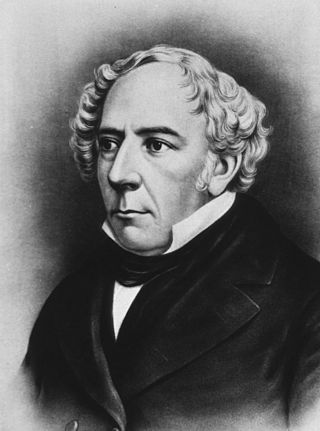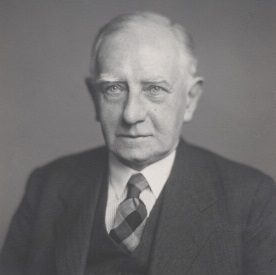Related Research Articles
Idealism in philosophy, also known as philosophical idealism or metaphysical idealism, is the set of metaphysical perspectives asserting that, most fundamentally, reality is equivalent to mind, spirit, or consciousness; that reality is entirely a mental construct; or that ideas are the highest type of reality or have the greatest claim to being considered "real". Because there are different types of idealism, it is difficult to define the term uniformly.

Thomas Reid was a religiously trained Scottish philosopher best known for his philosophical method, his theory of perception, and its wide implications on epistemology, and as the developer and defender of an agent-causal theory of free will. He also focused extensively on ethics, theory of action, language and philosophy of mind.

Sir William Hamilton, 9th Baronet FRSE was a Scottish metaphysician. He is often referred to as William Stirling Hamilton of Preston, in reference to his mother, Elizabeth Stirling.

Sir Peter Frederick Strawson was an English philosopher who spent most of his career at the University of Oxford. He was the Waynflete Professor of Metaphysical Philosophy at Magdalen College, Oxford from 1968 to 1987. He had previously held the positions of college lecturer and tutorial fellow at University College, Oxford, a college he returned to upon his retirement in 1987, and which provided him with rooms until his death.

Charles Margrave Taylor is a Canadian philosopher from Montreal, Quebec, and professor emeritus at McGill University best known for his contributions to political philosophy, the philosophy of social science, the history of philosophy, and intellectual history. His work has earned him the Kyoto Prize, the Templeton Prize, the Berggruen Prize for Philosophy, and the John W. Kluge Prize.
Compatibilism is the belief that free will and determinism are mutually compatible and that it is possible to believe in both without being logically inconsistent. As Steven Weinberg puts it: "I would say that free will is nothing but our conscious experience of deciding what to do, which I know I am experiencing as I write this review, and this experience is not invalidated by the reflection that physical laws made it inevitable that I would want to make these decisions." The opposing belief, that the thesis of determinism is logically incompatible with the classical thesis of free will, is known as "incompatibilism".
Lewis White Beck was an American philosopher and scholar of German philosophy specializing in German idealism. Beck was Burbank Professor of Intellectual and Moral Philosophy at the University of Rochester and served as the Philosophy Department chair there from 1949 to 1966. He translated several of Immanuel Kant's works, such as the Critique of Practical Reason, and was the author of Studies in the Philosophy of Kant (1965).

Norman Duncan Kemp Smith, FBA, FRSE was a Scottish philosopher who was Professor of Psychology (1906–1914) and Philosophy (1914–1919) at Princeton University and was Professor of Logic and Metaphysics at the University of Edinburgh (1919–1945).

Benedetto Croce, OCI, COSML was an Italian idealist philosopher, historian, and politician who wrote on numerous topics, including philosophy, history, historiography, and aesthetics. A political liberal in most regards, he formulated a distinction between liberalism and "liberism". Croce had considerable influence on other Italian intellectuals, from Marxists to Italian fascists, such as Antonio Gramsci and Giovanni Gentile, respectively.
Early modern philosophy The early modern era of philosophy was a progressive movement of Western thought, exploring through theories and discourse such topics as mind and matter, is a period in the history of philosophy that overlaps with the beginning of the period known as modern philosophy. It succeeded the medieval era of philosophy. Early modern philosophy is usually thought to have occurred between the 16th and 18th centuries, though some philosophers and historians may put this period slightly earlier. During this time, influential philosophers included Descartes, Locke, Hume, and Kant, all of whom contributed to the current understanding of philosophy.
Linda Trinkaus Zagzebski is an American philosopher. She is the Emerita George Lynn Cross Research Professor, as well as Emerita Kingfisher College Chair of the Philosophy of Religion and Ethics, at the University of Oklahoma. She writes in the areas of epistemology, philosophy of religion, and virtue theory.
Philosophical realism—usually not treated as a position of its own but as a stance towards other subject matters— is the view that a certain kind of thing has mind-independent existence, i.e. that it exists even in the absence of any mind perceiving it or that its existence is not just a mere appearance in the eye of the beholder. This includes a number of positions within epistemology and metaphysics which express that a given thing instead exists independently of knowledge, thought, or understanding. This can apply to items such as the physical world, the past and future, other minds, and the self, though may also apply less directly to things such as universals, mathematical truths, moral truths, and thought itself. However, realism may also include various positions which instead reject metaphysical treatments of reality altogether.
Paul Guyer is an American philosopher and a leading scholar of Immanuel Kant and of aesthetics. From 2012, he was Jonathan Nelson Professor of Philosophy and Humanities at Brown University until his retirement in 2023.
Common sense is "knowledge, judgement, and taste which is more or less universal and which is held more or less without reflection or argument". As such, it is often considered to represent the basic level of sound practical judgement or knowledge of basic facts that any adult human being ought to possess. It is "common" in the sense of being shared by nearly all people. The everyday understanding of common sense is ultimately derived from historical philosophical discussions. Relevant terms from other languages used in such discussions include Latin sensus communis, Ancient Greek κοινὴ αἴσθησις, and French bon sens. However, these are not straightforward translations in all contexts, and in English different shades of meaning have developed. In philosophical and scientific contexts, since the Age of Enlightenment the term "common sense" has been used for rhetorical effect both approvingly and disapprovingly. On the one hand it has been a standard for good taste, good sense, and source of scientific and logical axioms. On the other hand it has been equated to conventional wisdom, vulgar prejudice, and superstition.

Over the ages, Italian philosophy had a vast influence on Western philosophy, beginning with the Greeks and Romans, and going onto Renaissance humanism, the Age of Enlightenment and modern philosophy. Philosophy was brought to Italy by Pythagoras, founder of the school of philosophy in Crotone, Magna Graecia. Major philosophers of the Greek period include Xenophanes, Parmenides, Zeno, Empedocles and Gorgias. Roman philosophers include Cicero, Lucretius, Seneca the Younger, Musonius Rufus, Plutarch, Epictetus, Marcus Aurelius, Clement of Alexandria, Sextus Empiricus, Alexander of Aphrodisias, Plotinus, Porphyry, Iamblichus, Augustine of Hippo, Philoponus of Alexandria and Boethius.

Adrian William Moore is a British philosopher and broadcaster. He is Professor of Philosophy at the University of Oxford and tutorial fellow of St Hugh's College, Oxford. His main areas of interest are Kant, Wittgenstein, history of philosophy, metaphysics, philosophy of mathematics, philosophy of logic and language, ethics and philosophy of religion.
Brian P. Copenhaver is Distinguished Professor Emeritus of Philosophy and History at The University of California, Los Angeles. He teaches and writes about philosophy, religion and science in late medieval and early modern Europe.
Transcendental humanism in philosophy considers humans as simultaneously the originator of meaning, and subject to a larger ultimate truth that exists beyond the human realm (transcendence). The philosophy suggests that the humanistic approach is guided by "accuracy, truth, discovery, and objectivity" that transcends or exists apart from subjectivity.
The History of Philosophy Quarterly (HPQ) is a peer-reviewed academic journal dedicated to the history of philosophy. The journal is indexed by PhilPapers and the Philosopher's Index.
References
- ↑ Davis, William C. (3 July 2016). "Thomas Reid on mind, knowledge, and value". British Journal for the History of Philosophy. 24 (4): 788–790. doi:10.1080/09608788.2016.1176898. ISSN 0960-8788. S2CID 147708749.
- ↑ Gur Arye, Adam Weiler (June 2016). "Rebecca Copenhaver and Todd Buras (eds.), Thomas Reid on Mind, Knowledge, and Value". Journal of Scottish Philosophy. 14 (2): 190–193. doi:10.3366/jsp.2016.0129. ISSN 1479-6651.
- ↑ Rubini, Rocco (2014). "Brian P. Copenhaver and Rebecca Copenhaver, eds. From Kant to Croce: Modern Philosophy in Italy, 1800–1950. Lorenzo da Ponte Italian Library Series. Toronto: University of Toronto Press, 2012. ix + 860 pp. $115. ISBN: 978-1-4426-4266-9". Renaissance Quarterly. 67 (1): 238–240. doi:10.1086/676191. S2CID 163458738.
- ↑ Hanley, Ryan Patrick (14 December 2014). "Review of The Oxford Handbook of British Philosophy in the Eighteenth Century". Notre Dame Philosophical Reviews. ISSN 1538-1617.
- ↑ Buras, J. Todd (2005). "The Nature of Sensations in Reid". History of Philosophy Quarterly. 22 (3): 221–238. ISSN 0740-0675. JSTOR 27745026.